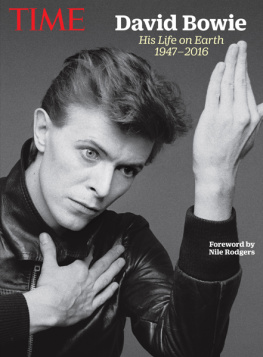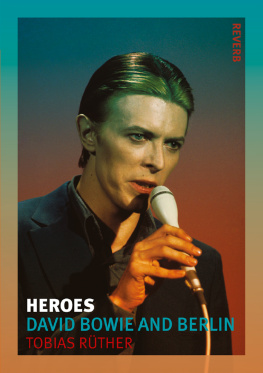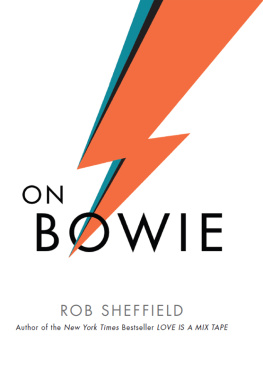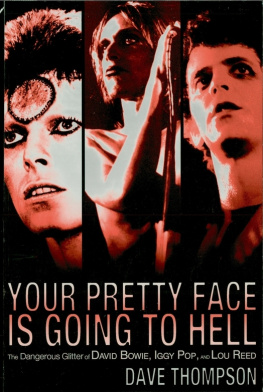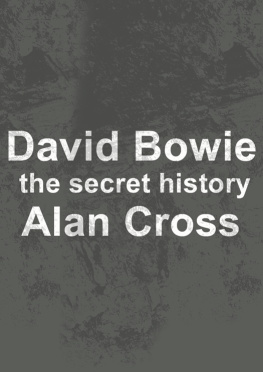To Mom, Dad, Morgan, Jessica, Sebastian and Lara
Many of the early records bearing Tony Viscontis name made me eager to get out into the worldif only to agitate. In 1971-72 the mighty blaze of T.Rex singles were beyond price to me. They had all the immediate eager motion of pop records, but were also strangely reflectivea mad stew of Englishness and worldliness with Tonys name on each side of the label. If you enjoyed the music of T.Rex it seemed to prove that you were someone. Here, it seemed, was Art in motion: guitar savagery chopping up the soundstage; pop with intellectual distinction, using full orchestraif only for a mere twenty haughty seconds.
Making the T.Rex soundscape both fantastic and naturalistic was an abrasive clash of non-traditional routes to the pop conclusion. The wealth and detail and contrast of layered orchestration wrapped around the unravelled riddle of Marc Bolans poetry (well, lets call it that) worked so well that Bolan stayed beside Tony almost until Bolans life ended with death. At its highest artistic peak, with the strange flood of Telegram Sam and Metal Guru we are assaulted by the musical equivalent of secret stairways and false walls, and something enters into me which I can barely fathom. I wanted pop music to be true, and it was with David Bowies LP The Man Who Sold the World, which enlivened 1972 as a forgotten reissue, edging up to #;26 in the British charts. It is a soft sound, with luxuriant confidence from Bowie, whose imagination was served by the Visconti methodology. Still, today, it stands as David Bowies best work. The first side, especially, is musical literacy delivered.
With Bowie, the tone and cadence are all there: no sentimentalism. The instrumental textures are wispy and often child-like; acoustic and recorder sounds of turn-of-the-70s dropout London. The Bowie-Visconti vision is concentrated. A good producer gets at something in a singer (or musician) and Tony was there to nail the gift of Bowie just perfectlymaking suffering sound like a superior conditionlive this life or dont live any. Listen to the album even now and you are right back there. The mavericks are those who liberate themselves, and Bowie and Visconti did so with The Man Who Sold the World and we played our part by listening.
The Mael machinery of Sparks utilized Tony for their 1975 surgical offering, Indiscreet. The versifying of Ron Mael introduced a new style of pop poetry, and the scattershot pace of Russell Maels vocals sounded like someone running out of a burning house. Russell had been a T.Rex fan, and by 1975 it was Sparks themselves who were shaking public tastes. Indiscreet was their fifth album of great resonance, lunging to #18 in the chart. The sound of this album is so chaotic that it often seems to play for laughs. Either the Maels, or Tony Visconti, were asking: What can we show them that is new? From a tipsy teatime waltz to unstoppable violins, the pace pulverized the listener, and Russells mouth seemed unable to close. There are so many latitude and longitude instrumental textures that the masterstroke was just almost overcooked. Since Ron and Russell Mael were obviously insane, Tony could only have walked into this session armed with a swirl of guesswork. The disorder lay in the electronic savagery of the Maels, who had spent their early lives strapped to an iron bed. Pulling them back from the edge, Indiscreet (somehow a commercial venture) produced two riotously diverse hit singles.
The most important feature of recorded noise is the pleasure it can bring to the listener. Tony has alwayssomehowbeen a part of my life, but I didnt ever imagine that his success-ridden career would lead him to me, nor I to him, yet in 2005 we recorded Ringleader of the Tormentors in Rome. As a non-musician/ skimmer-scholar, Ive always known what I wanted without always knowing how to get it. Many years on from the escapist spirits of Bolan and Bowieit is still therein the Visconti walk. An actor would be thrilled to discover a new expression for the camera, as Tony Visconti is delighted to ambush the end of a song with a new musical twist. He has astounding recall of whatever it is hes just heard, and he can talk and listen at the same time. The point of a good recording is to make us more aware of ourselvesas singers or musicians, and Ringleader of the Tormentors stands as a joy greater than pleasure for me. In several countries across Europeit zaps to #1.
Tony understands the code of music brilliantly, and he is not authoritarian in the patronizing way that so many producers who have left their fingerprints on the 1960s and 1970s are. He is persuasive without ever making you need to disembarrass yourself; his role is complicity. There are many respected bores of Tonys generation, nursing memories and resentments and never letting the trapped listener forgetbut Tony isnt like that. He doesnt pick over the Saxon remains of T.Rex; the time is always now. He is a noble example of the self-flogger who knows that the song doesnt end just because its over. Musical notations are images, and the Visconti style is timeless and lionized and is therefore forevermore.
MORRISSEY
October 2006
Introduction
What is a Record Producer?
A group of musicians and a lead singer pour their hearts out into a handful of microphones. When the song finishes a cheerful voice from the control room booms over the speaker, Thats it boys, its a take! and the band members slap each other on the back and run into the control room to their awaiting girlfriends who are, of course, all models and starlets. Its a notion and an image that has Hollywoods fingerprints all over itreality is a little different.
On my first recording session, I was the bass player; I too heard that booming voice, only he said, That wasnt very good. You guys will have to keep going until you get it right. Bass player: your E string is flat! We were desperately bashing out this song for an hour or so under the audio equivalent of a microscope. The booming voice was right. The playback of our last take was sloppy and my bass was out of tune. Left to our own devices we wouldve given up and said that was the best we could do. But the booming voice was persistent, and the next few takes steadily got better, all the more so for checking the tuning of my bass before each take. The booming voice saved the day.
When I grew up I became a booming voice, well, actually a booming voice with the nasal Brooklyn accent. I wanted to be the lead singer or at the very least just one of the boys in the band, but circumstances put me in the directors chair instead. The circumstances uprooted me from Manhattan and planted me firmly on British soil at the height of Swinging London. I took root and stayed there for nearly 23 years. In the end, I think it was a better deal.
The role of a record producer hasnt changed much since Fred Gaisberg cut the performances of opera singers to wax cylinders in the 1890s. He instructed them to move closer or further from a horn; he was the voice of experience, helping the artists to get their performances to a high standard onto the recording medium.
The first time I heard the term Producer was in the 60s when a mad looking man on the Jack Paar TV show (one of the very first talk shows) audaciously proclaimed that he dictated the musical taste of teenagers in America. He was introduced as a record producer and his name was Phil Spector. I already loved his productions without really knowing that someone other than the artists and musicians were involved (I still melt when I hear Walking In The Rain by the Ronettes). It was Spector who brought this role to the publics attention, but most records of that time were still produced anonymously. It was many years later that the great Quincy Jones admitted to arranging and producing Its My Party for Lesley Gore in 1963.


